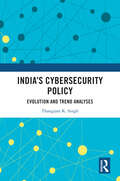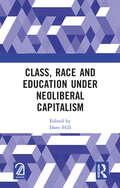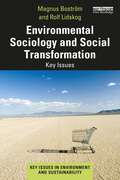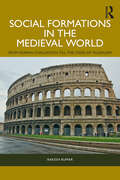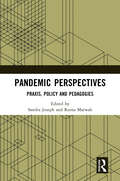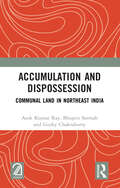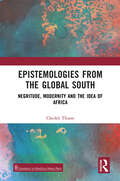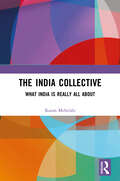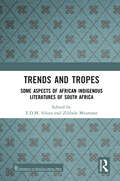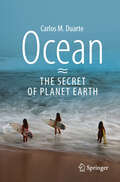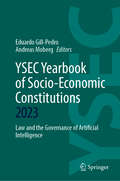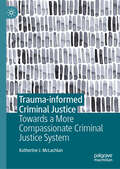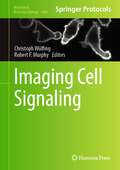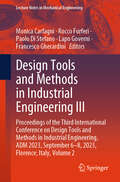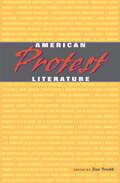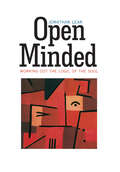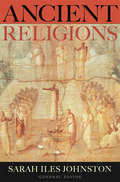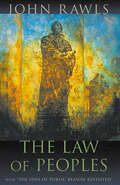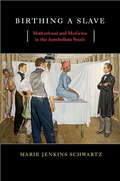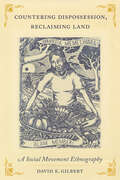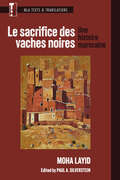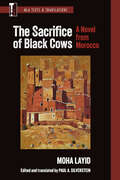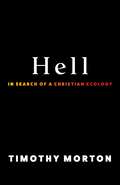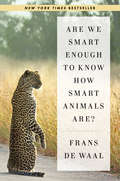- Table View
- List View
India’s Cybersecurity Policy: Evolution and Trend Analyses
by Thangjam K. SinghThis book examines India’s public policies on cybersecurity and their evolution over the past few decades. It shows how threats and vulnerabilities in the domain have forced nation-states to introduce new policies to protect digital ecosystems. It charts the process of securitisation of cyberspace by the international system from the end of the 20th century to the present day. It also explores how the domain has become of strategic interest for many states and the international bodies which eventually developed norms and policies to secure the domain.Consequently, the book discusses the evolution of cybersecurity policy at global level by great powers, middle powers, and states of concern and compares them with the Indian context. It also highlights the requirement of introducing/improving new cybersecurity guidelines to efficiently deal with emerging technologies such as 5G, Artificial Intelligence (AI), Big Data (BD), Blockchain, Internet of Things (IoT), and cryptocurrency.The book will be of great interest to scholars and researchers of cybersecurity, public policy, politics, and South Asian studies.
Class, Race and Education under Neoliberal Capitalism
by Dave HillWith the onset of Austerity Capitalism and Immiseration Capitalism, and with the increasing commodification, marketisation and privatisation of society and of education, Marxist Theory and Marxist Education Theory have taken on a new urgency.In this collection of essays, written from a classic Marxist perspective, Dave Hill lays bare how the capitalist class in the knowledge industry/academia, use ideological (and repressive) state apparatuses, such as education, to divide, disarm and demoralise critical, Marxist analysis and activism.This title is co-published with Aakar Books. Print edition not for sale in South Asia (India, Sri Lanka, Nepal, Bangladesh, Pakistan and Bhutan)
Environmental Sociology and Social Transformation: Key Issues (ISSN)
by Rolf Lidskog Magnus BoströmEnvironmental Sociology and Social Transformation demonstrates how sociological theory and research are critical for understanding the social drivers of global environmental destruction and the conditions for transformative change.Written by two professors of sociology who are deeply involved in the international community of environmental sociology, Magnus Boström and Rolf Lidskog argue that we need to better understand society as well as the fundamentally social nature of environmental problems and how they can be addressed. The authors provide answers to why so many unsustainable practices are maintained and supported by institutions and actors despite widespread knowledge of their negative consequences. Employing a pluralistic sociological approach to the study of social transformations, the book is divided into five key themes: Causes, Distributions, Understandings, Barriers, and Transformation. Overall, the book offers an integrative and comprehensive understanding of the social dimension of (un)sustainability, societal inertia, and conditions for transformative change. It provides the reader with references from classic and contemporary sociology and uses pedagogical features including boxes and questions for discussion to help embed learning.Arguing that a broad and deep social transformation is needed to avoid a global civilization crisis, Environmental Sociology and Social Transformation will be a great resource for students and scholars who are exploring current environmental challenges and the societal conditions for meeting them.
Social Formations in the Medieval World: From Roman Civilization till the Crisis of Feudalism
by Rakesh KumarThis book encapsulates a period of history of human progress by highlighting crucial social, economic, and cultural dynamics. It presents recent historiography and new analytical tools used to analyse multi-dimensional themes involved in social formation. This is a reader-friendly book with simple and lucid language and fulfils the pressing needs of students studying the paper ‘Social Formations and Cultural Patterns of Ancient and Medieval World’ at various universities across the world. The summary, keywords, and representative questions at the end of each chapter would assist in revision and better understanding of the issues dealt therein. A detailed chapter-end reference would enable and motivate the readers to engage in further studies for better understanding of the themes.This book will be of interest to students, researchers, and academics in the area of history—ancient and medieval world history in particular and anthropology. It will also be an interesting read for general readers interested in knowing about the ancient and medieval world.
Pandemic Perspectives: Praxis, Policy and Pedagogies
by Reena Marwah Sandra JosephThe book explores the impacts of the COVID-19 pandemic on nations across the globe since early 2020. It hosts a variety of perspectives within economic, social and development research studies, providing contemporary and proper information. The book also presents policy prescriptions for developing economies, critiques the system of disease surveillance and waste management, and defines a vision for India's development. It also mirrors issues related to digitisation, marginalisation, government regulations and health systems and provides original ideas for innovative methodologies suitable for higher education.Print edition not for sale in South Asia (India, Sri Lanka, Nepal, Bangladesh, Pakistan and Bhutan)
Accumulation and Dispossession: Communal Land in Northeast India
by Gorky Chakraborty Asok Kumar Ray Bhupen SarmahThis book sketches a road map of privatisation, accumulation and dispossession of communal land in the tribal areas of North East India from pre-colonial times to the neo-liberal era.Spread over five chapters, this study unfolds the privatisation of communal land in the backdrop of a larger theoretical and historical canvas. It deals with the different institutional modes of privatisation, accumulation and dispossession of communal land, the changes in land use and cropping patterns, the changes in land relations and the land-based identity of the tribal community as a result. The conclusive chapter makes a broader reflection of the grand narrative of privatisation, accumulation and dispossession of communal land in North East India.This title is co-published with Aakar Books. Print edition not for sale in South Asia (India, Sri Lanka, Nepal, Bangladesh, Pakistan and Bhutan)
Epistemologies from the Global South: Negritude, Modernity and the Idea of Africa
by Cheikh ThiamThis book argues that the pervasiveness of the modern paradigm and its corollary, the colonial matrix of power, have led scholars of Negritude to think of Leopold Sedar Senghor’s work either as an anti-thesis to the anti-Blackness constitutive of European modernity or as another manifestation of the West as subject of history. As opposed to this tradition, the book reads Negritude through the prism of endogenous African world views without the filter of the modern Western paradigm.Print edition not for sale in Sub Saharan Africa.
The India Collective: What India is Really All About
by Karan MehrishiProsperous countries have a socio-economic operating system, which India lacks. This book argues that India must incorporate a structure aligned with its collective identity to compete globally for wealth creation. The book, divided into three epochs—Past, Present, and Future—offers a comprehensive understanding of India as a country, economy, and value system.Print edition not for sale in South Asia (India, Sri Lanka, Nepal, Bangladesh, Pakistan and Bhutan)
Trends And Tropes: Some Aspects of African Indigenous Literatures of South Africa
by E.D.M. Sibiya Zilibele MtumaneThis collection explores topical and current issues in indigenous African language literature of South Africa. These include narratological elements of literature, language usage, poetry analysis, and song lyrics. Each scholar presents findings that are particular to their research, thus making the book a valuable source of knowledge penned in a diversity of writing styles across different literary genres.Seventy per cent of the chapters are written in English and thirty per cent in isiZulu, a gesture towards encouraging research presentations in indigenous languages. Also of interest is that the chapter content covers traditional or largely obsolete forms such as folklore and essays.Print edition not for sale in Sub Saharan Africa.
Ocean - The Secret of Planet Earth
by Carlos M. DuarteThe ocean characterises planet Earth and differentiates it from the more than 5000 known planets. It is also the habitat where life emerged as a singularity in the universe. However, we know less about the oceans than we do about some remote planets such as Mars.This book provides basic facts for understanding the oceans, their properties and their importance to mankind through the ages. The long relationship between the ocean and humanity, which permeates all areas of our culture, is at a crossroads where human activity is profoundly affecting its functioning and the integrity of marine ecosystems. However, the intelligent and rational use of the ocean holds, in large part, the key to providing the resources needed to sustain our quality of life in the future. Unlocking, through scientific research, the secrets that the ocean still holds is an essential challenge for humanity. This book informs the reader about all these aspects of the ocean through a text that combines scientific rigour with personal reflections based on the author's own experiences, dedicated to exploring and learning more about the ocean.
YSEC Yearbook of Socio-Economic Constitutions 2023: Law and the Governance of Artificial Intelligence (YSEC Yearbook of Socio-Economic Constitutions #2023)
by Eduardo Gill-Pedro Andreas MobergArtificial intelligence (AI) has the potential to radically transform our society. It may lead to a massive increase in the capabilities of humankind and allow us to address some of our most intractable challenges. It may also entail profound disruption to structures and processes that have sustained our society over centuries. These developments present a unique challenge to the socio-economic constitutional arrangements which govern our world at national, regional and international level. The deployment of increasingly powerful AI systems, able to function with increasing degree of autonomy, has led to concerns over loss of human control of important societal processes, over the disruption of existing economic, social and legal relationships, and over the empowerment of some societal actors at the expense of others, together with the entrenchment of situations of domination or discrimination. It has also made increasingly clear how tremendous the potential benefits, that these technologies may bring, are to those who successfully develop and deploy them. There is therefore great pressure on governments, international institutions, public authorities, civil society organisations, industry bodies and individual firms to introduce or adapt mechanisms and structures that will avoid the potentially negative outcomes of AI and achieve the positive ones. These mechanisms and structures, which have been given the umbrella term ‘AI governance’, cover a wide range of approaches, from individual firms introducing ethical principles which they volunteer to abide by, to the European Union legislating an AI Act, which will prohibit certain types of AI applications and impose binding obligations on AI developers and deployers. The fast pace of innovation in the development of AI technologies is mirrored by the fast pace of development of the emerging field of AI governance, where traditional legislation by public bodies is complemented with more innovative approaches, such ashybrid and adaptive governance, ethical alignment, governance by design and the creation of regulatory sandboxes. The chapter “AI and Sensitive Personal Data Under the Law Enforcement Directive: Between Operational Efficiency and Legal Necessity” is available open access under a Creative Commons Attribution 4.0 International License via link.springer.com.
Trauma-informed Criminal Justice: Towards a More Compassionate Criminal Justice System
by Katherine J. McLachlanThis book is the first to examine trauma-informed criminal justice responses to the commission of crime and its impact through empathy and humanity. Trauma-informed criminal justice uses compassion to achieve a safer community for everyone. There are three parts: the first examines how adversity, trauma and crime are related. The second focuses on trauma-informed criminal justice responses to people who have offended, victims of crime, and professionals at risk of vicarious trauma. The third focuses on trauma-informed sentencing and compassionate justice through therapeutic jurisprudence and judicial empathy. Each chapter is designed to be a stand-alone resource.
Imaging Cell Signaling (Methods in Molecular Biology #2800)
by Robert F. Murphy Christoph WülfingThis volume explores recent innovations across the entire pipeline of imaging signal transduction, cell preparation, cellular manipulation, image acquisition, and computational analysis. The chapters in this book cover topics such as rapid preparation of living Drosophila pupal macrophages for ex vivo imaging; controlling the potency of T cell activation using an optically tuneable chimeric antigen receptor; in situ imaging of proteins using DNA-PAINT super-resolution microscopy; reconstructing signaling networks using biosensor barcoding; and morphological, spatial, and dynamic models for cellular components. Written in the highly successful Methods in Molecular Biology series format, chapters include introductions to their respective topics, lists of the necessary materials and reagents, step-by-step, readily reproducible laboratory protocols, and tips on troubleshooting and avoiding known pitfalls.Cutting-edge and authoritative, Imaging Cell Signaling is a valuable resource that provides guidance to researchers looking to learn how to effectively tailor design projects to image, manipulate, and model signal transduction.
Design Tools and Methods in Industrial Engineering III: Proceedings of the Third International Conference on Design Tools and Methods in Industrial Engineering, ADM 2023, September 6–8, 2023, Florence, Italy, Volume 2 (Lecture Notes in Mechanical Engineering)
by Francesco Gherardini Rocco Furferi Lapo Governi Paolo Di Stefano Monica CarfagniThis book gathers original peer-reviewed papers reporting on innovative methods and tools in design, modeling, simulation and optimization, and their applications in engineering design, manufacturing, and other relevant industrial sectors. Based on contributions to the Third International Conference on Design Tools and Methods in Industrial Engineering, ADM 2023, held on September 6–8, 2023, in Florence, Italy, and organized by the Italian Association of Design Methods and Tools for Industrial Engineering, and the Department of Industrial Engineering of the University of Florence, this second volume of a 2-volume set focuses on interdisciplinary topics in design, such as human body acquisition and modelling, human factors and user-centered design, digital factories, and design methods for different engineering applications. All in all, this book provides academics and professionals with a timely overview and extensive information on trends and technologies in industrial design and manufacturing.
American Protest Literature (The John Harvard library #99)
by Howard Zinn“I like a little rebellion now and then”—so wrote Thomas Jefferson to Abigail Adams, enlisting in a tradition that throughout American history has led writers to rage and reason, prophesy and provoke. This is the first anthology to collect and examine an American literature that holds the nation to its highest ideals, castigating it when it falls short and pointing the way to a better collective future.American Protest Literature presents sources from eleven protest movements—political, social, and cultural—from the Revolution to abolition to gay rights to antiwar protest. Each section reprints documents from the original phase of the movement as well as evidence of its legacy in later times. Informative headnotes place the selections in historical context and draw connections with other writings within the anthology and beyond. Sources include a wide variety of genres—pamphlets, letters, speeches, sermons, legal documents, poems, short stories, photographs, posters—and a range of voices from prophetic to outraged to sorrowful, from U.S. Presidents to the disenfranchised. Together they provide an enlightening and inspiring survey of this most American form of literature.
Open Minded: Working Out the Logic of the Soul
by Jonathan LearFreud is discredited, so we don’t have to think about the darker strains of unconscious motivation anymore. We know what moves our political leaders, so we don’t have to look too closely at their thinking either. In fact, everywhere we look in contemporary culture, knowingness has taken the place of thought. This book is a spirited assault on that deadening trend, especially as it affects our deepest attempts to understand the human psyche—in philosophy and psychoanalysis. It explodes the widespread notion that we already know the problems and proper methods in these fields and so no longer need to ask crucial questions about the structure of human subjectivity.“What is psychology?” Open Minded is not so much an answer to this question as an attempt to understand what is being asked. The inquiry leads Jonathan Lear, a philosopher and psychoanalyst, back to Plato and Aristotle, to Freud and psychoanalysis, and to Wittgenstein. Lear argues that Freud and, more generally, psychoanalysis are the worthy inheritors of the Greek attempt to put our mindedness on display. There are also, he contends, deep affinities running through the works of Freud and Wittgenstein, despite their obvious differences. Both are concerned with how fantasy shapes our self-understanding; both reveal how life’s activities show more than we are able to say.The philosophical tradition has portrayed the mind as more rational than it is, even when trying to account for irrationality. Psychoanalysis shows us the mind as inherently restless, tending to disrupt its own functioning. And empirical psychology, for its part, ignores those aspects of human subjectivity that elude objective description. By triangulating between the Greeks, Freud, and Wittgenstein, Lear helps us recover a sense of what it is to be open-minded in our inquiries into the human soul.
Ancient Religions (Blackwell Ancient Religions Ser. #3)
by Sarah Iles JohnstonReligious beliefs and practices, which permeated all aspects of life in antiquity, traveled well-worn routes throughout the Mediterranean: itinerant charismatic practitioners journeying from place to place peddled their skills as healers, purifiers, cursers, and initiators; and vessels decorated with illustrations of myths traveled with them. New gods encountered in foreign lands by merchants and conquerors were sometimes taken home to be adapted and adopted. This collection of essays by a distinguished international group of scholars, drawn from the groundbreaking reference work Religions of the Ancient World, offers an expansive, comparative perspective on this complex spiritual world.
The Reaper’s Garden: Death and Power in the World of Atlantic Slavery
by Vincent BrownWinner of the Merle Curti AwardWinner of the James A. Rawley PrizeWinner of the Louis Gottschalk PrizeLonglisted for the Cundill Prize“Vincent Brown makes the dead talk. With his deep learning and powerful historical imagination, he calls upon the departed to explain the living. The Reaper’s Garden stretches the historical canvas and forces readers to think afresh. It is a major contribution to the history of Atlantic slavery.”—Ira BerlinFrom the author of Tacky’s Revolt, a landmark study of life and death in colonial Jamaica at the zenith of the British slave empire.What did people make of death in the world of Atlantic slavery? In The Reaper’s Garden, Vincent Brown asks this question about Jamaica, the staggeringly profitable hub of the British Empire in America—and a human catastrophe. Popularly known as the grave of the Europeans, it was just as deadly for Africans and their descendants. Yet among the survivors, the dead remained both a vital presence and a social force.In this compelling and evocative story of a world in flux, Brown shows that death was as generative as it was destructive. From the eighteenth-century zenith of British colonial slavery to its demise in the 1830s, the Grim Reaper cultivated essential aspects of social life in Jamaica—belonging and status, dreams for the future, and commemorations of the past. Surveying a haunted landscape, Brown unfolds the letters of anxious colonists; listens in on wakes, eulogies, and solemn incantations; peers into crypts and coffins, and finds the very spirit of human struggle in slavery. Masters and enslaved, fortune seekers and spiritual healers, rebels and rulers, all summoned the dead to further their desires and ambitions. In this turbulent transatlantic world, Brown argues, “mortuary politics” played a consequential role in determining the course of history.Insightful and powerfully affecting, The Reaper’s Garden promises to enrich our understanding of the ways that death shaped political life in the world of Atlantic slavery and beyond.
The Law of Peoples: With “The Idea of Public Reason Revisited”
by John RawlsThis book consists of two parts: “The Law of Peoples,” a major reworking of a much shorter article by the same name published in 1993, and the essay “The Idea of Public Reason Revisited,” first published in 1997. Taken together, they are the culmination of more than fifty years of reflection on liberalism and on some of the most pressing problems of our times by John Rawls.“The Law of Peoples” extends the idea of a social contract to the Society of Peoples and lays out the general principles that can and should be accepted by both liberal and non-liberal societies as the standard for regulating their behavior toward one another. In particular, it draws a crucial distinction between basic human rights and the rights of each citizen of a liberal constitutional democracy. It explores the terms under which such a society may appropriately wage war against an “outlaw society” and discusses the moral grounds for rendering assistance to non-liberal societies burdened by unfavorable political and economic conditions.“The Idea of Public Reason Revisited” explains why the constraints of public reason, a concept first discussed in Political Liberalism (1993), are ones that holders of both religious and non-religious comprehensive views can reasonably endorse. It is Rawls’s most detailed account of how a modern constitutional democracy, based on a liberal political conception, could and would be viewed as legitimate by reasonable citizens who on religious, philosophical, or moral grounds do not themselves accept a liberal comprehensive doctrine—such as that of Kant, or Mill, or Rawls’s own “Justice as Fairness,” presented in A Theory of Justice (1971).
Birthing a Slave: Motherhood and Medicine in the Antebellum South
by Marie Jenkins SchwartzThe deprivations and cruelty of slavery have overshadowed our understanding of the institution's most human dimension: birth. We often don't realize that after the United States stopped importing slaves in 1808, births were more important than ever; slavery and the southern way of life could continue only through babies born in bondage.In the antebellum South, slaveholders' interest in slave women was matched by physicians struggling to assert their own professional authority over childbirth, and the two began to work together to increase the number of infants born in the slave quarter. In unprecedented ways, doctors tried to manage the health of enslaved women from puberty through the reproductive years, attempting to foster pregnancy, cure infertility, and resolve gynecological problems, including cancer.Black women, however, proved an unruly force, distrustful of both the slaveholders and their doctors. With their own healing traditions, emphasizing the power of roots and herbs and the critical roles of family and community, enslaved women struggled to take charge of their own health in a system that did not respect their social circumstances, customs, or values. Birthing a Slave depicts the competing approaches to reproductive health that evolved on plantations, as both black women and white men sought to enhance the health of enslaved mothers--in very different ways and for entirely different reasons.Birthing a Slave is the first book to focus exclusively on the health care of enslaved women, and it argues convincingly for the critical role of reproductive medicine in the slave system of antebellum America.
Countering Dispossession, Reclaiming Land: A Social Movement Ethnography
by David E. GilbertTwo decades ago, a group of Indonesian agricultural workers began occupying the agribusiness plantation near their homes. In the years since, members of this remarkable movement have reclaimed collective control of their land and cultivated diverse agricultural forests on it, repairing the damage done over nearly a century of abuse. Countering Dispossession, Reclaiming Land is their story. David E. Gilbert offers an account of the ways these workers-turned-activists mobilized to move beyond industrial agriculture's exploitation of workers and the environment, illustrating how emancipatory and ecologically attuned ways of living with land are possible. At a time when capitalism has remade landscapes and reordered society, the Casiavera reclaiming movement stands as an inspiring example of what struggles for social and environmental justice can achieve.
Le sacrifice des vaches noires: Une histoire marocaine (MLA Texts and Translations #44)
by Moha LayidAn oasis community in Morocco hopes to stop a devastating drought by sacrificing black cows to satisfy the spirits. But the wise elder Bassou secretly plans a different solution: to sabotage the motorized pumps that have lowered the water table and nearly destroyed the subsistence farming and herding that support the local way of life. The young newlywed Yidir agrees to help him and eventually becomes a part of the broader fight for Moroccan independence from French colonial rule.Portraying an indigenous community undergoing radical change, Le sacrifice des vaches noires reflects on notions of modernity and tradition, science and spirituality, free will and fate, and considers the moral obligations of individuals and community. First published in French in 1992, the novel received international acclaim and is regarded as the single best work about Amazigh culture in southeastern Morocco. It was adapted into the award-winning film Atash (Thirst) by the Moroccan director Saâd Chraïbi in 2000.
The Sacrifice of Black Cows: A Novel from Morocco (MLA Texts and Translations #44)
by Moha LayidAn oasis community in Morocco hopes to stop a devastating drought by sacrificing black cows to satisfy the spirits. But the wise elder Bassou secretly plans a different solution: to sabotage the motorized pumps that have lowered the water table and nearly destroyed the subsistence farming and herding that support the local way of life. The young newlywed Yidir agrees to help him and eventually becomes a part of the broader fight for Moroccan independence from French colonial rule. Portraying an indigenous community undergoing radical change, The Sacrifice of Black Cows reflects on notions of modernity and tradition, science and spirituality, free will and fate, and considers the moral obligations of individuals and community. First published in French in 1992, the novel received international acclaim and is regarded as the single best work about Amazigh culture in southeastern Morocco. It was adapted into the award-winning film Atash (Thirst) by the Moroccan director Saâd Chraïbi in 2000. Here, it is presented in a riveting new translation by Paul A. Silverstein.
Hell: In Search of a Christian Ecology
by Timothy MortonHell on earth is real. The toxic fusion of big oil, Evangelical Christianity, and white supremacy has ignited a worldwide inferno, more phantasmagoric than anything William Blake could dream up and more cataclysmic than we can fathom. Escaping global warming hell, this revelatory book shows, requires a radical, mystical marriage of Christianity and biology that awakens a future beyond white male savagery.Timothy Morton argues that there is an unexpected yet profound relationship between religion and ecology that can guide a planet-scale response to the climate crisis. Spiritual and mystical feelings have a deep resonance with ecological thinking, and together they provide the resources environmentalism desperately needs in this time of climate emergency. Morton finds solutions in a radical revaluation of Christianity, furnishing ecological politics with a language of mercy and forgiveness that draws from Christian traditions without bringing along their baggage. They call for a global environmental movement that fuses ecology and mysticism and puts race and gender front and center. This nonviolent resistance can stage an all-out assault on the ultimate Satanic mill: the concept of master and slave, manifesting today in white supremacy, patriarchy, and environmental destruction. Passionate, erudite, and playful, Hell takes readers on a full-color journey into the contemporary underworld—and offers a surprising vision of salvation.
Are We Smart Enough to Know How Smart Animals Are?
by Frans de WaalA New York Times bestseller: "A passionate and convincing case for the sophistication of nonhuman minds." —Alison Gopnik, The Atlantic Hailed as a classic, Are We Smart Enough to Know How Smart Animals Are? explores the oddities and complexities of animal cognition—in crows, dolphins, parrots, sheep, wasps, bats, chimpanzees, and bonobos—to reveal how smart animals really are, and how we’ve underestimated their abilities for too long. Did you know that octopuses use coconut shells as tools, that elephants classify humans by gender and language, and that there is a young male chimpanzee at Kyoto University whose flash memory puts that of humans to shame? Fascinating, entertaining, and deeply informed, de Waal’s landmark work will convince you to rethink everything you thought you knew about animal—and human—intelligence.
